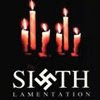
The Sixth Lamentation
by William Brodrick
narrated by Gordon Griffin
"What should you do if the world has turned against you? When Father Anselm is asked this question by an old man at Larkwood Priory, his response is to have greater resonance than he could ever have imagined. For that evening the old man returns, demanding the protection of the church. His name is Eduard Schwermann and he is wanted by the police as a suspected war criminal."It's either the book's fault or my fault, and I don't know which. The problem was either that the story's not very engaging and a bit too complicated, or else it's that I left a huge gap between reading the first two thirds and the last third. So I had probably forgotten some of the key points from earlier on, and being an audio book I couldn't skim through the first half to catch up (see below). And some of it was hard to believe factually, and most of the relationships weren't very realistic, and altogether I wish I hadn't bothered. But I rarely leave a book unfinished.
Feet of Clay
by Terry Pratchett
"There's a werewolf with pre-lunar tension in Ankh-Morpork, and a dwarf with attitude and a Golem who's begun to think for itself. But for Commander Vimes, Head of Ankh-Morpork City Watch, that's only the start. He's not only got to find out whodunit, but howdunit too. He's not even sure what they dun."Slightly different from the other Discworld books, this is a proper mystery, but he makes the usual mistake (as far as I'm concerned) of introducing loads of characters in the first few chapters to the extent that I can't follow the story at all. Combined with a bit of a break in my reading, it meant that I had to go back and read the start again. It was worth it though, unlike the book above.
Blackout
by Connie Willis
"The narrative opens in Oxford, England in 2060, where a trio of time traveling scholars prepares to depart for various corners of the Second World War. Their mission: to observe, from a safe vantage point, the day-to-day nature of life during this critical historical moment. As the action ranges from the evacuation of Dunkirk to the manor houses of rural England to the quotidian horrors of London during the Blitz, the objective nature of their roles gradually changes."This is actually the first half of a two-part story, the second half being in the next book 'All Clear'. Connie Willis is the author of one of my favourite books, and has constructed a theory of time travel along with a distinctive style of writing that depends quite heavily on cliffhangers. This can be annoying, but the writing is good enough to mitigate this fault, and she actually conveys aspects of the Blitz in London that I hadn't really thought about before, like the very real fear that German forces would invade, and the knock at the door of the air-raid shelter would reveal German troops.
All Clear
by Connie Willis
"The impossibility of altering past events has always been a core belief of time-travel theory - but it may be tragically wrong. When discrepancies in the historical record begin cropping up, it suggests that one or all of the future visitors have somehow changed the past - and, ultimately, the outcome of the war."More cliffhangers, more flabby narrative, and ultimately an ending that probably ties the loose ends up nicely. I say 'probably' because the two books contain stories set within at least four different time periods and with five main characters, most of whom use different names in each time period. I wasn't paying as much attention as perhaps I should have, so now I'm not even sure that I understood who was doing what at which time, and I ought to go back and read the two books again. But they are much too long for that. She could have done with better editing, and condensed the whole thing into half the size, i.e. one book, in which case there would have been less period detail, but I would have been prepared to read it again. Maybe some other time.



Have you read Ken Follett's Winter of the World already? It came out this month and it's so worth reading (it's a historical novel). My e-book version was 730 pages and I read it in just a few days. He has a way of taking you through the story without the reader getting lost and he weaves in all the separate strands (he writes about the second world war from a British, American and Russian perspective).
ReplyDeleteI've never read anything by Ken Follett. I'll put it on the list, although my pile of books to be read never seems to get any smaller, so I don't know when I'll ever get round to it!
Delete